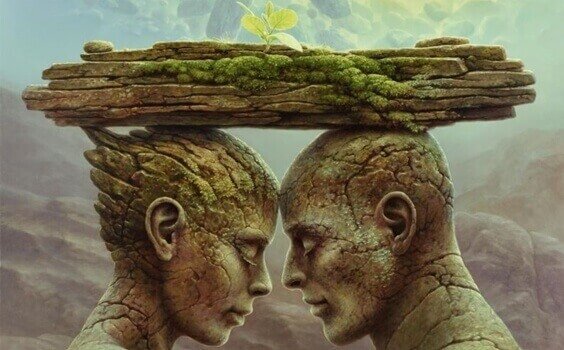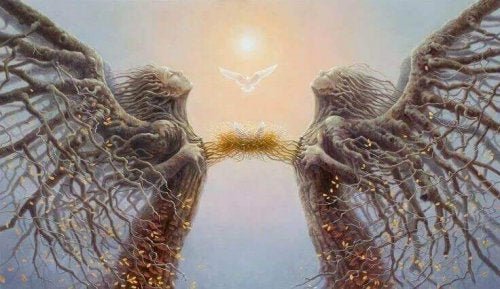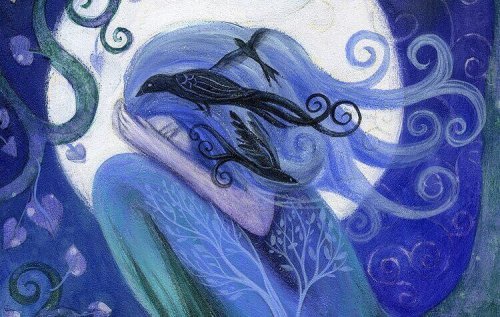Have you ever wondered what happens when you connect with another person and shortly after discover things you do not like? Jacques Lacan's mirror theory helps us understand this process. According to the author, the construction of our personal identity occurs through self-capture in other people. In this way, the relationships we maintain with others are reflections or projections of aspects of our personality that we like or dislike.
What is mirror theory?
Just as there are parts of our body and our image that we do not like when we look at ourselves in a mirror, there are aspects of our personality that we do not accept. We find in other reflections that we do not accept, this whole matter is repressed by our unconscious. In other words, we identify in ourselves some traits that we like less than others, even if only symbolically. Then, in part, what we do not like about others is also unpleasant here.
We are constantly projecting a part of our being. Therefore, the mirror theory is a vision that proposes a change of point of view: instead of thinking that we must protect ourselves from the other so that it does not hurt, we have this vision that gives rise to the question "Why am I experiencing this? situation with this person and what part of her that I can not stand is in me? " As, in general, we can not see our own shadows or virtues, life offers us the gift of the relationships we live to show us directly what is hidden in us. The other simply serves as a mirror: it reflects us and gives us the opportunity to find ourselves.

Direct or inverted mirror
The mirror theory can act directly or inversely. Let's take an example. Imagine that you can not stand the selfishness of your partner or friend. Directly, you can be projecting that part of yourself that is selfish and you reject. On the contrary, this person can reflect how unimportant you are for your interests. You can depend on others too much and pass them in front of you. In one way or another, the other gives us very valuable information about our knowledge and our evolution.
What you do not like about yourself, I correct at home.
You may think that your boss is too demanding with you. You can be very demanding and perfectionist with yourself and your leader is only a reflection of this requirement that you impose. On the other hand, you may be too tolerant and need a bit of rigor in your life. And we know that virtue is in balance.

Emotional wounds
We do not cure anything with a bandage. When we hurt ourselves, we express our pain first; Then, when we are calm, we clean the wound and take care of it with the right tools. Do not hide it and do not forget that it will never be cured in this way. We must control it until it is completely cured. The same happens with other types of injuries.
We all have emotional wounds. Emotional wounds are all those emotions, feelings, thoughts and actions that arise during one or more painful moments in our lives that we have not been able to overcome and accept. We became prisoners of these emotions by staying in a fictional prison. Our well-being depends on the transformation of these emotions and ways of thinking into wisdom and experiences, so that they serve as a driving force for us to move forward.

Injuries as a reflex
When we forget our wounds, they end up staying in our subconscious and influencing our thoughts, moods and behaviors. The emotional deficiencies begin to reside within our being, which come from our early childhood, but they wake up and / or strengthen when we do not care.
Therefore, very often, we find in our spouse-deficiency very similar to ours. And that is precisely what causes the union. For example, two people who have suffered a lot for love meet and discover that love is not synonymous with suffering. The same wound united this couple. Both people work as reflections. But it is necessary to proceed with caution because the wounds that come together can also be separated.
If each member of the couple does not heal their wounds, sooner or later they will deteriorate the relationship. Insecurities, fears, jealousy, possessiveness ... It is as if life tried to send you reflections to indicate the path by which you must move forward to grow. If you do not analyze them and do not pay attention to the information they give you, it will not evolve, or it will, but more slowly, and your relationships will be more fragile. That is why the links we maintain with others, taking into account the theory of the mirror, can provide us with very valuable information about ourselves and the state of these wounds that we do not yet have. integrated into our history.



